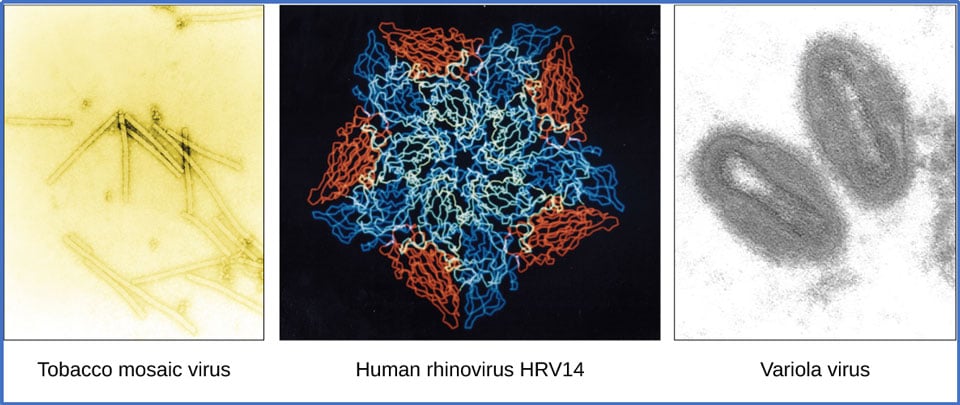What are viruses, and why are they elusive and deadly?
While the corona virus is driving us crazy let us understand the science (biology) of viruses.
There is a fascinating world that is not visible to our plain eyesight. Scientists call it the microscopic world. Bacteria and viruses are the prime residents that is normally invisible to our naked eyes. The word virus refers to an incredibly large variety of organisms. They are unbelievably diverse in their form, structure, ingredients, agility, survival and more. When we say animals, we mean fish, cockroach, mouse, dog (and their varieties), elephants, lions, tigers and more. Similarly, viruses are unbelievably diverse, in their form, structure, ingredients, agility, survival, where they live (habitat), how they live (lifestyle) and more (Figure 1). This comparison between animals and viruses may give you an idea about the depth and breadth of virus varieties.

Figure 1: Viruses come in assorted sizes, shapes and shades. These images illustrate diversity among various virus types. Source: Biology 2e by OpenStax is licensed under Creative Commons Attribution License v4.0.
The coronavirus:
The coronavirus is a group that share some similar features, akin to different dog breeds. COVID-19, may be a bulldog (or pick your choice of dogs), a specific type among the dogs. The previous versions like SARS and MERS are other ill known cousins. You may compare them to may be a German Shepard and a Bloodhound. Let us clear it up, all bulldogs are dogs but not all dogs are bulldogs. So, Covid-19 is a coronavirus, but not all viruses are coronavirus. If we use the same comparison, (when provoked) bulldogs maybe deadly, German Sheppard maybe ferocious and so on and so forth. Similarly, unlike Covid-19 which maybe deadly, other virus types may harm but not kill us.

Figure 2: Artist rendition of a Coronavirus. Image courtesy cdc.gov
Where do viruses live?
Viruses are home wreckers.
Unlike other animals, viruses need some other life form to live and reproduce. Viruses cannot live outside of any cell. Actually, viruses cannot feed themselves, cloth themselves and make babies themselves. In short, they can’t live alone. Viruses need to rent a space within a bacterium, animal cell, plant cell or human cell. Nevertheless, viruses are not good renters. They squat (illegally occupy) in a cell, they use the cell to make a living, and when they decide to move out, they invariably damage (kill) the cell which they called ‘home’ till then. They search for a new cell (host, house) to live, reproduce and kill. The life goes on and the life and death cycle continue.

Figure 3. Virus reproduction cycle illustrated using influenza virus. Image courtesy: Biology 2e by OpenStax is licensed under Creative Commons Attribution License v4.0.
How do I protect self from catching coronavirus?
Well it is difficult to answer. Viruses live everywhere. Therefore, it is next to impossible to avoid them.
Covid-19 is a new virus. Our knowledge about its stability and spread is limited. It is reported that Covid-19 is easily killed by heat and may live (active) on the surface for anywhere between a few hours to several days. You may disinfect suspected surfaces using alcohol-based cleaning agents.
The next best thing is prevention and protection. Our body has its own defense mechanism called immunity. In normal life, immunity(body’s self-defense mechanism) protects us from many infections. It works so efficiently that we may not even be aware of such infections. Vaccines (the flu shots you get every fall) protect us from a fraction of the viral infections. General hygiene and healthy lifestyle are the key to live disease free. The following points list a few healthy hygienic practices. Take shower at least once a day, wash your hands, face and rinse your mouth whenever you reach home or office, before and after eating or drinking. Keep your area study area, kitchen table, office cubicle, work desks neat, clutter free, and clean. If you want to disinfect your study or work area use hot water, CDC, FDA or OSHA approved disinfectants or 70% rubbing alcohol. Any type of alcohol removes water (dehydrates) from your body. Therefore, whenever you use any alcohol-based disinfectants or hand sanitizers, always use a moisturizer. After taking all the precautions, if you get dry cough and fever over 102oF, keep yourself away from others and immediately seek medical help.
About the author:
Subbarayan R Pochi Ph.D. is an accomplished infectious diseases researcher. At the National Institute of Health, Tokyo, Japan he led a research project to develop vaccines against Enterotoxic E. coli (ETEC) that causes economic devastation in pig farms. Currently, he is the director of Full Potential Learning Academy (https://FullPotentialTutor.Com) a one-on-one tutoring center located in Miami Lakes, FL, where students learn one-on-one onsite and live online. Take online tutoring, Beat the coronavirus. You can email Dr. Pochi at director@FullPotentialTutor.Com.
